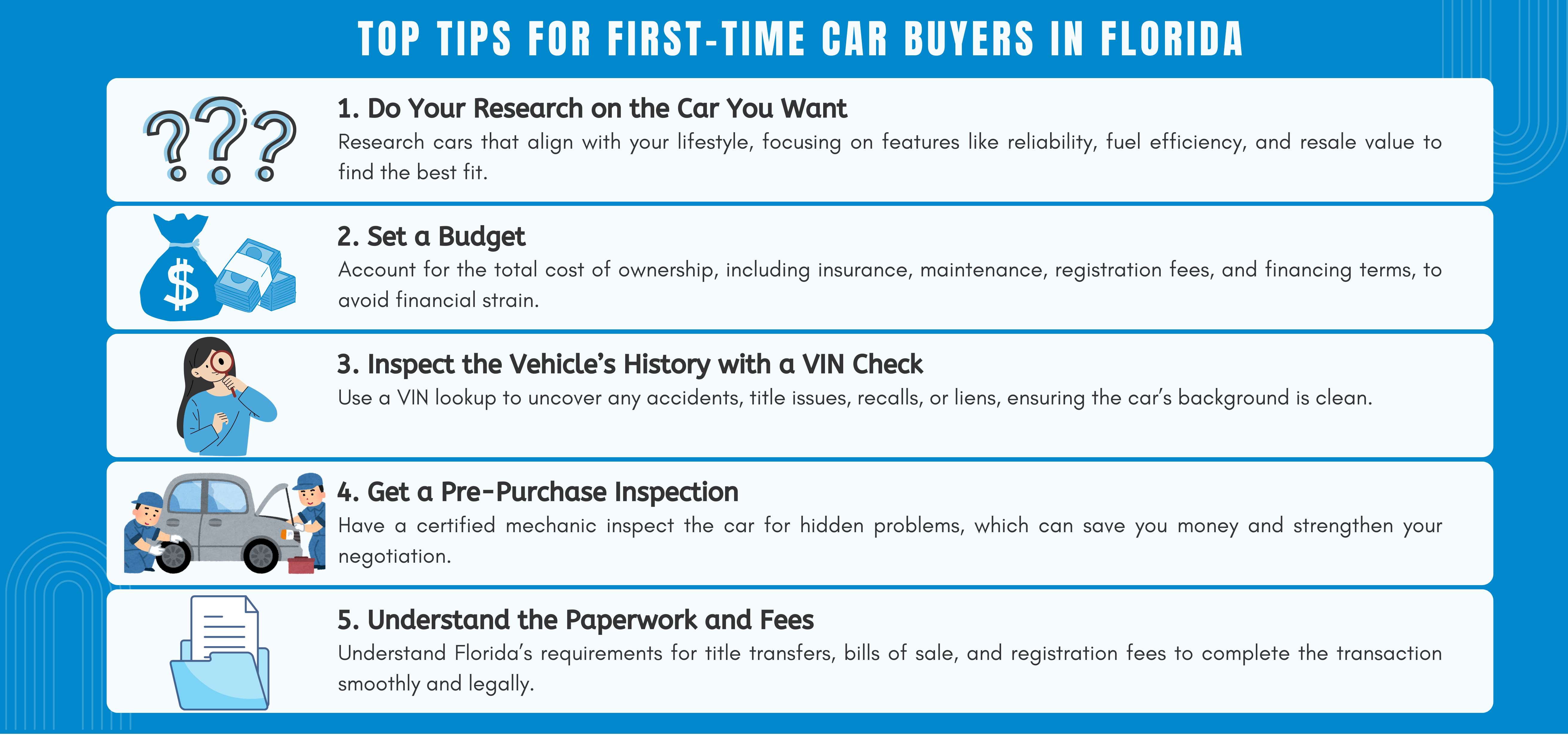
When buying a vehicle in Florida, buyers must ensure the car meets state inspection and safety standards. Florida has regulations ensuring vehicles meet safety and emissions standards to protect drivers and the environment.
The Florida VIN check is essential for revealing critical vehicle history, compliance, and potential safety or roadworthiness issues. Consider personal preferences like style, color, sunroof, heated seats, and advanced safety features.
Don’t leave your purchase to chance. Before buying a car in Florida, make sure to run a VIN number check to verify its history and ensure you’re making a safe investment!

1. Do Your Research on the Car You Want
Before diving into the car-buying process, it’s essential to have a clear understanding of your needs. Start by assessing your lifestyle and how you plan to use the vehicle.
For example, if you have a growing family, an SUV or minivan with ample seating and cargo space might be ideal. If you have a long commute, you might prioritize fuel efficiency and comfort. Understanding the vehicle’s features is key to making a choice that fits your life.
Additionally, take into account any personal preferences such as the car’s style, color, and features like a sunroof, heated seats, or advanced safety technologies. Research reliable models with low maintenance costs and good resale value using consumer reports, reviews, and ratings.
Once you have a narrowed list of options, you can start comparing them based on your specific needs.
2. Set a Budget
Setting a realistic budget is crucial in the car-buying process. Consider both the vehicle price and ownership costs. In addition to the car’s purchase price, consider the cost of insurance, which can vary significantly depending on the make and model of the car.
Consider all costs, including insurance and long-term ownership, when setting a budget. Factor in fuel, maintenance, and repairs. Don’t forget to calculate registration fees, taxes, and any additional dealership fees.
Establish a financing plan if necessary, taking into account loan terms, interest rates, and your credit score. A clear budget keeps your finances manageable and ensures the car remains affordable over time.
3. Inspect the Vehicle’s History with a VIN Check
Before committing to a used car purchase, always check the vehicle’s history using its Vehicle Identification Number (VIN). A VIN lookup can provide crucial information about the car’s past, including whether it has been involved in any accidents, had its title branded (e.g., salvage, rebuilt, or flood damage), or has outstanding recalls.
In Florida, a VIN check reveals if a vehicle has liens or is reported stolen. Many services, like Carfax or AutoCheck, offer free or paid VIN reports with detailed vehicle history.
A clean history report boosts confidence in buying a reliable car, while red flags should cause concern.
4. Get a Pre-Purchase Inspection
Even if a used car looks good and has a clean history, get it inspected by a certified mechanic. A pre-purchase inspection reveals hidden issues like engine problems, brake wear, or rust under the vehicle.
A mechanic can assess if the car was properly maintained, checking for neglected maintenance or poorly handled repairs. An expert inspection provides valuable insights into the car’s true condition, which can influence your negotiation.
The inspection gives an objective evaluation of the car’s condition, which can aid negotiations if issues arise. It can also save you money in the long run by identifying problems before you buy.
5. Understand the Paperwork and Fees
Once you’ve decided on a car, understanding the paperwork involved is critical to ensuring a smooth transaction. The title transfer is one of the most important documents, as it proves ownership of the vehicle. Be sure that the title is clear, meaning there are no liens or legal claims against it. Verify that the seller’s name matches the name on the title and that there are no discrepancies.
In Florida, you’ll need a bill of sale outlining purchase terms and acting as a receipt for the transaction. Additionally, be prepared for taxes, registration fees, and any other administrative costs, which can vary by county in Florida.
Familiarizing yourself with the state’s legal paperwork ensures a hassle-free transaction. Ensure you understand any local taxes or fees associated with vehicle purchases and registration.
Double-check that all forms are completed accurately before submitting them to the appropriate Florida authorities to avoid complications with ownership transfer or future legal issues.
Following these steps will not only protect you from potential problems but also help you make an informed and confident car-buying decision.
Your first car in Florida? Make it stress-free with a Florida VIN check!
Purchasing your first car in Florida can be a smooth and rewarding experience if you follow these essential steps. A Florida VIN check free tool is a crucial part of your due diligence, providing peace of mind and protecting your investment.
By researching the car, setting a budget, performing a VIN check, and getting a pre-purchase inspection, you’ll ensure that your first car is both reliable and affordable. Using tools like VIN check services and professional inspections can further reduce the likelihood of hidden issues after the sale.
Don’t wait—start your Florida VIN check now and drive with confidence!